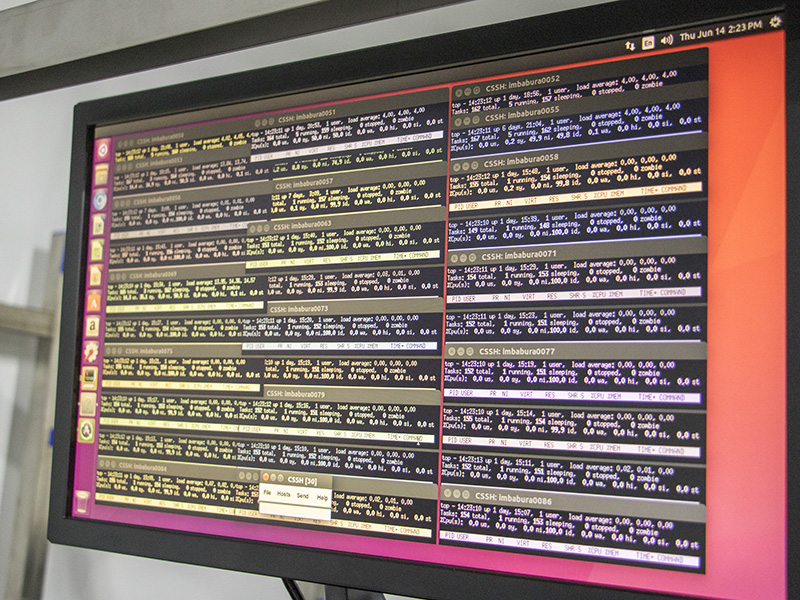The Imbabura Cluster will help Computational Physics at Yachay Tech

The cluster was established under the direction of Duncan John Mowbray, BMath, BSc, MSc, PhD., Professor in the School of Physical Sciences and Nanotechnology.
The School of Physical Sciences and Nanotechnology at Yachay Tech University opened the Imbabura Computer Cluster in June 2018. The purpose of this cluster is to provide students and faculty a platform to perform computational physics parallel calculations. Currently, the cluster has 35 work stations, or nodes, that connect together via a switch to a front node that is accessible from inside or outside the University campus. Each node runs the Ubuntu 18.04 operating system and consists of Intel Xeon 3.6 Ghz Quad Cores with 32 Gb of RAM, with access via RSA public/private key exchange. Installed software includes GPAW, Quantum Espresso, SIESTA, Orca, DFTB, and Mathematica.
The Imbabura computer cluster is located at the E2-E3 laboratories Data Center. The main characteristic of this room is a twenty kilovolt UPS that serves the purpose of protecting equipment from power outages. When one of these episodes occur, the UPS will maintain power flow to all the equipment for 3 hours. This gives the team a chance to shut down the system manually and prevent data and progress losses. Along with the air conditioning system that provides a constant temperature of 18 oC in the room, these are the main reasons the team decided to place Imbabura in the Data Center.
Imbabura has the capacity to process various calculations concurrently over individual or groups of nodes. The system works in a way that any set of nodes can run a calculation, passing messages, through the switch, to each other, and then outputting the final result to the front node. The 1 Gbit/s switch, donated by the Canadian company Pundit, connects the computers so they can both pass messages to each other and access the same disk and write the results of their calculations on it. A calculation process works like this: the front node collects data and creates a list of “jobs” for the other computers to do, each computer will complete a job either individually or as part of a group, and return the results to the main disk of the front node that can then assign another job. This is accomplished using the Slurm Workload Manager. This is a queuing system that manages tasks on the cluster. In this way, students and professors can log onto the front node and run a job that will be sorted in terms of priority and assigned to the right set of nodes to ensure the cluster is used at its full capacity.
One example of the use of the cluster would be the calculation of a molecule’s vibrations. To start, an experimental physicist would observe the energies at which a molecule absorbs a laser light source via Raman or Infrared spectorscopy. This should result in a spectra showing the energies of vibrations of the molecule. In order to simulate this it is necessary to run calculations of the molecule’s total energy when displacing each of the atoms, one by one, in every direction. This is when the cluster comes in handy. It is possible to run each of these calculations on a different computer, then the cluster compiles them all together on the central node, and a computational physicist would then use the resulting matrix to calculate the vibrations of the entire molecule.
This cluster will help to give the students experience working with a job scheduler, which is what they would have to do in order to use any supercomputing system. So, as a part of their courses, students will learn about using a high performance computer environment, or supercomputers. The Imbabura computer cluster is available not only to students taking the Computational Physics courses, but all students and faculty from Yachay Tech University who would like to make use of supercomputing facilities in their research. Professors and students from both Yachay Tech and other universities can request access from Prof. Mowbray at dmowbray@yachatech.edu.ec.